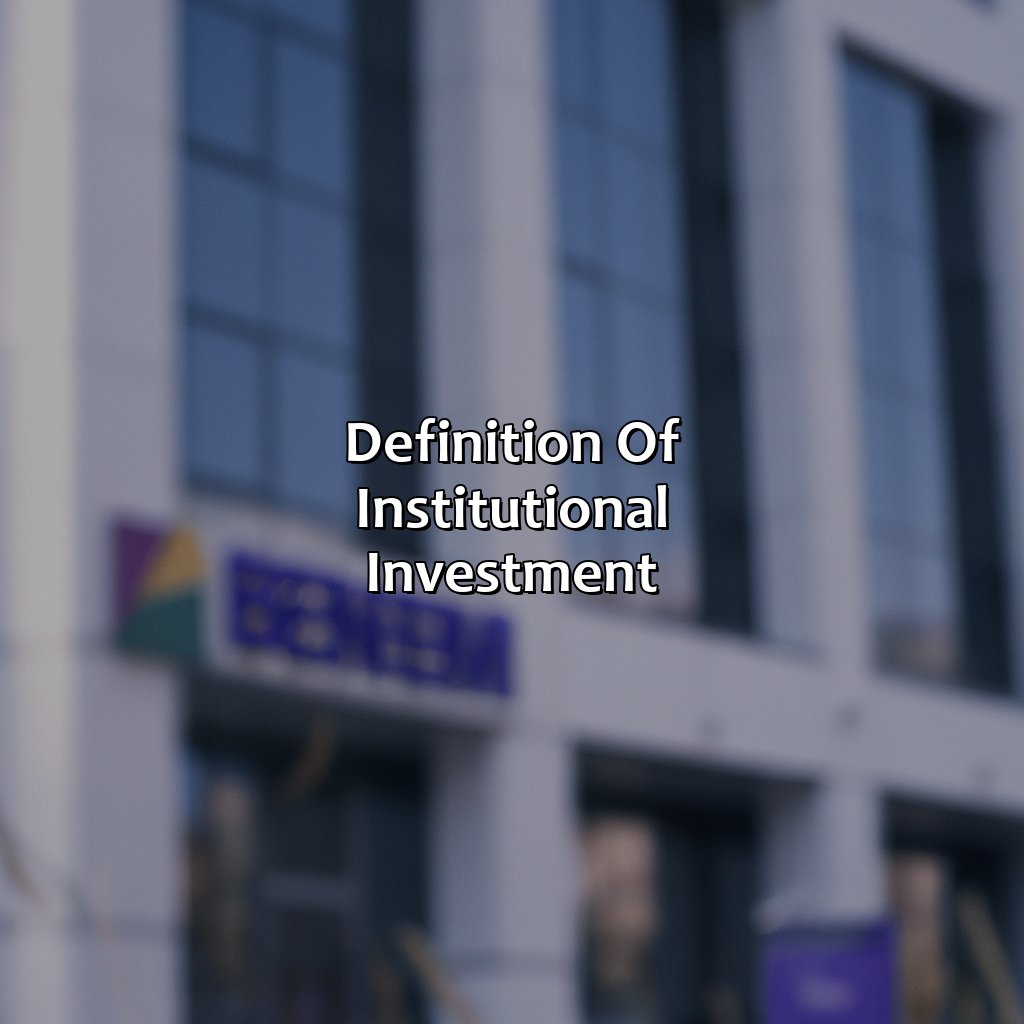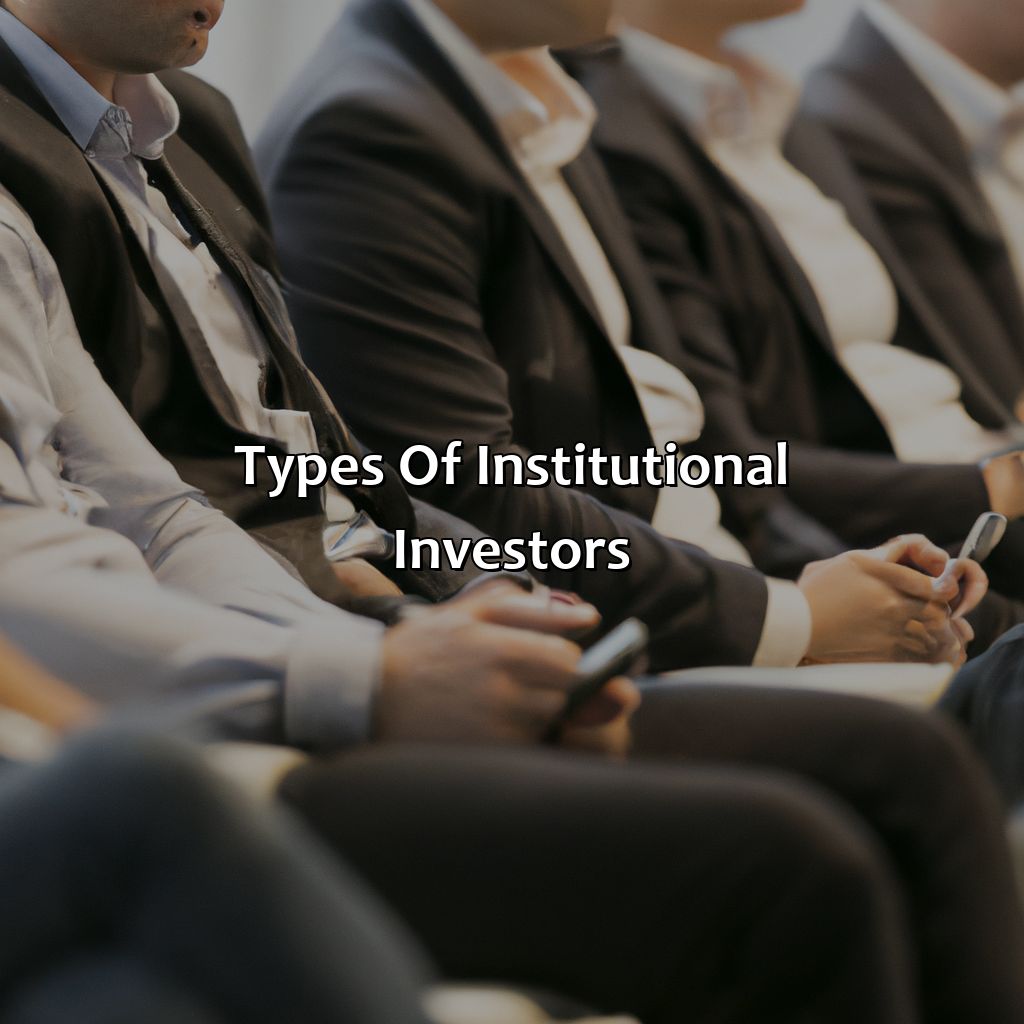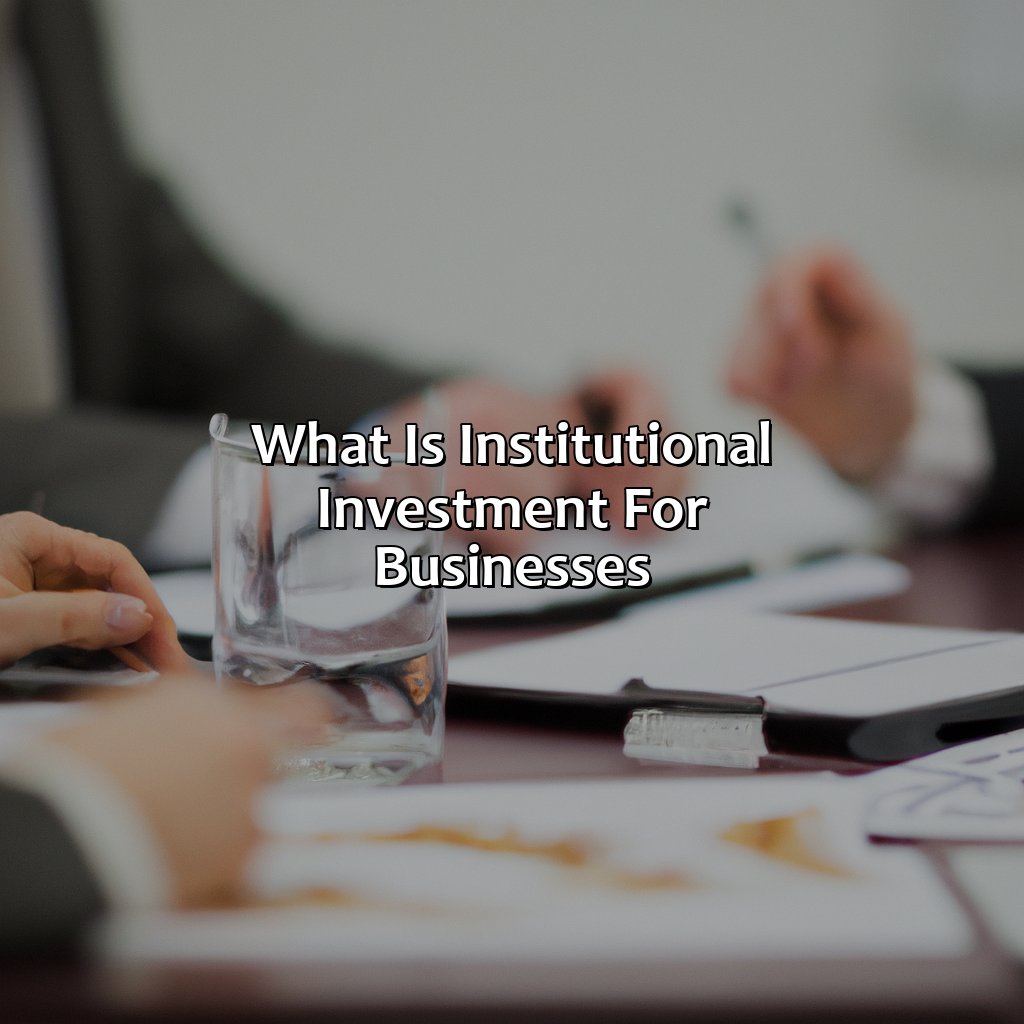What Is Institutional Investment For Businesses?
Key Takeaway:
- Institutional investment refers to the investment of large sums of money from organizations rather than individual investors. This can include pension funds, insurance companies, and endowments, among others.
- Different types of institutional investors have different investment objectives, risk tolerances, and investment strategies. Understanding the different types of investors can help businesses determine which types of institutional investors may be a good fit.
- One of the main benefits of institutional investment for businesses is access to large amounts of capital that can help them grow and expand. Additionally, institutional investors typically have a long-term investment horizon, which can provide stability and consistency for businesses.
- However, there are also drawbacks to institutional investment, including loss of control and potential conflicts of interest. Businesses must carefully consider their goals and priorities before deciding if institutional investment is the right choice for them.
Are you interested in understanding how institutional investment can benefit your business? Discover the financial and strategic advantages of securing institutional funding for your company. Be prepared to leverage this powerful source of capital and unlock your business’ growth potential.
Definition of institutional investment
Institutional Investment refers to the investment done by large corporations, financial institutions, or any established entities that invest in various financial instruments as a strategy to diversify the portfolio and maximize the returns. This type of investment is generally for long-term and has high entry barriers- only entities with large sums of money can enjoy the benefits. Consequently, such investments have a substantial impact on the country’s economy and financial markets, as they hold a significant share.
Institutional investors use various investment strategies like passive and active management to achieve their investment goals. They can opt for both debt and equity instruments, such as bonds, stocks, mutual funds, and exchange-traded funds (ETFs). Institutional investors can also invest in alternative assets such as real estate, private equity, and commodities, along with traditional assets. Additionally, as they deal with large sums of money, they have a say in the capital formation, corporate governance, and financial management decisions of corporations they invest in.
A crucial aspect of Institutional Investment is the impact it has on the economy and society. Institutional investors have the power to influence the dynamics of financial markets and support economic growth. They also hold a significant responsibility in ensuring ethical investments while considering environmental and social factors. Investing in companies that align with ESG (Environmental, Social, and Governance) principles is a growing trend among institutional investors, incentivizing companies to uphold these standards.
Pro Tip: Institutional investors are experts in financial analysis and management, making their strategies and portfolio worth observing and learning from for individuals and smaller businesses.

Image credits: retiregenz.com by David Arnold
Types of institutional investors
Do you want to know about the various types of institutional investors involved in businesses? Look no further! Types of Institutional Investors is the section for you. Here, you can find out about different types of investors such as pension funds, insurance companies, and endowments and foundations. Learn how each investor can be beneficial to your business in its own special way.

Image credits: retiregenz.com by Joel Duncun
Pension funds
Investment made by organizations on behalf of their employees for post-retirement benefits is a significant aspect of institutional investment. These investments are known as Retirement Benefit Schemes (RBS). Pension funds, one of the most important types of RBS, are created to provide financial support to employees after retirement. They invest in various assets like stocks, bonds, and real estate to generate returns that will be shared amongst their pensioners.
Pension funds differ from other institutional investors in terms of their long-term goals and need for stability and security in their investments. The primary objective of pension funds is to secure the financial future of their members. Typically, pension funds invest in fewer assets with lower risks to ensure constant returns over an extended period.
Pension funds distribute payments amongst members based on the investment made during employment years. Members receive periodic payments as defined by the scheme’s rules upon retirement. As per global trends, governments are framing policies that mandate employers must contribute a specified amount towards employee’s pension funds.
Pro Tip: Employers must review the rules carefully before contributing and select a reputable fund registered under applicable regulations to safeguard employee interests.
If you think insurance companies are boring, just wait until you see their investment portfolios.
Insurance companies
Institutional investors with a focus on risk management, such as the ones that come from insurance companies, possess the potential to aid businesses in raising capital and managing risks. Such investors typically require above-average returns and may demand detailed reports and presentations.
Insurers are classified as conservative institutions that seek efficiently managed investments across global markets, resulting in a robust portfolio of stocks, bonds, and other assets. They tend to invest heavily in stable securities or industries with low volatility scores to ensure revenue streams for themselves and their clients.
An insurance company’s investment strategy is fundamentally geared towards ensuring long-term growth and maximizing shareholder value while taking steps to manage risk appropriately. They have access to exclusive data related to economic trends and are skilled at making informed investing choices based on extensive analysis of market patterns and risk models derived from proprietary algorithms. Some major insurers have also established specialized investment funds determined by underwriting discipline or focused on specific sectors, like infrastructure funds or property trust mandates.
One pension firm was looking for support for its massive payout streams when they were returned about an investment opportunity set up by a Non-profit Organization involved in making homes safer for all. After thorough checks on the performance numbers since inception (which suggested that it would produce long-term cash flow) and the safety features built into each home (which knocked down the cost of homeowners claims) – they decided to invest millions into funding projects monthly which were designed to construct safe housing for locals throughout North America as part of their broader ESG campaign – which was just what this Non-profit needed!
Endowments and foundations: where wealthy people play a game of charity roulette with other people’s money.
Endowments and foundations
Institutional investors with philanthropic aims are investors that come into categories like Trust Funds and Charity Organizations. They invest substantial capital, often comprising donations from benefactors, to achieve their goals. Endowments have a long-term vested interest in the companies they invest in and can make significant portfolio changes as they see fit.
Foundations also fall under the category of institutional investors who target social impact investing by supporting a specific cause or mission through grants or equity investments. These foundations’ professionals evaluate investment opportunities based on whether they align with their organizational objectives and social values.
Endowments and foundations contribute significantly to venture capitalists, especially in funding startups that promote a particular mission or social benefit. Foundation investments tend to be more rigorously evaluated before funding is agreed upon than traditional venture capitalists.
It takes time for a foundation to assess how well the products or services promoted by early-stage ventures will cater to their desired goal, which increases deal due diligence duration. According to Forbes.com, Over 30% of donations received by Nonprofits are from Foundations alone-a trend set for large scale growth ahead.
Why settle for a little investment when you can have a whole institution throwing money at your business? It’s like having a rich uncle on speed dial.
Benefits of institutional investment for businesses
Institutional investment can benefit businesses with large capital. Solutions? Long-term investment, diversification and risk reduction.
Advantages of institutional investment include:
- Long-term investment horizon
- Diversification
- Risk reduction

Image credits: retiregenz.com by Yuval Jones
Access to large amounts of capital
Through institutional investment, businesses can access a vast pool of funds that can help them to expand and develop. Such investment is characterized by large-scale funding from investors such as pension funds, endowments, and insurance companies. These investors provide capital for investments in various sectors such as real estate and infrastructure projects.
Institutional investment ensures that businesses have a greater level of financial security while reducing operational costs. This access to funds also enables companies to allocate their risks more effectively, thereby increasing their potential returns on investments. With the ability to secure substantial financing from institutional investors, businesses can achieve their long-term goals that may not have been possible otherwise.
In addition to providing financial stability, institutional investment offers additional benefits such as access to professional expertise from experienced investors who are knowledgeable in different industries. They offer guidance and support on how best to utilize the vast resources made available through institutional investments. Their support includes offering business advice and mentoring, negotiating terms and conditions with other stakeholders in the industry on behalf of these businesses.
A true story depicting the benefits of institutional investment is East India Company’s revival after having gone bankrupt in 1858 due to declining profits from its trading activities with Asia. After undergoing several revitalization strategies over the years with no significant progress possible due to inadequate financing options, Lloyds of London provided a lifeline to East India Company by injecting capital through institutional investment leading it back up from near-bankruptcy.
Investing for the long-term is like planting a tree – it takes time, patience, and a solid foundation, but the payoff is worth it.
Long-term investment horizon
Investing for the future: Why a long-term investment approach is beneficial for firms. By adopting a sustainable and long-term investment strategy, businesses are better equipped to face market volatility and maximize returns. This kind of investment approach enables companies to take calculated risks on key projects and ventures that can pay off in the long run. Additionally, a long-term outlook can help firms to maintain good relationships with investors, who value consistency and predictability.
Moreover, taking a patient approach to investments allows companies to focus on achieving their desired outcomes without being sidetracked by short-term market conditions. Instead of attempting to achieve quick gains, businesses should adopt an investment strategy that looks beyond market fluctuations and instead focuses on creating long-term value for stakeholders.
For example, consider a manufacturing company planning to upgrade its production facility by installing energy-efficient equipment. While this change might involve significant upfront costs, it can result in reduced operating expenses over time. A sustainable and patient investment strategy enables businesses to make such decisions for better productivity and profitability.
Overall, institutional investment helps businesses navigate the ups and downs of the market while simultaneously achieving their goals for growth over an extended period. By prioritizing long-term prospects over short-lived gains or losses, companies can create sustained value not only for themselves but also for their investors and other stakeholders. Investing in multiple baskets may not prevent you from dropping the ball, but it sure can reduce the damage.
Diversification and risk reduction
A key benefit of institutional investment for businesses is the potential for diversification, leading to reduced risk. By pooling funds with other investors, businesses can have access to a wider range of investments across different industries and regions, thus minimizing the impact of any downturn in one particular sector. These diversified portfolios also provide a more stable return on investment.
In addition to reducing risk, institutional investment can also offer access to larger amounts of capital that may not be available through other means. This can help businesses expand and grow without having to rely solely on debt financing or individual investors.
Moreover, investing with institutional managers who have a deep understanding of the market trends and industry insights is beneficial. They conduct research and analyze data before making an informed decision on where to invest money so as to get maximum returns.
According to a study published by McKinsey & Company in 2020, around 68% of companies acknowledge this diversification advantage offered by sophisticated institutional-investor clients as one of the reasons why they seek their partnership for successful innovation in today’s environment.
Looks like institutional investment can come with a few strings attached – kind of like a bad blind date with a rich banker.
Drawbacks of institutional investment for businesses
Business owners need to understand the negatives of institutional investment: loss of control and potential conflict. Institutional investors may want a say in decisions in return for money. This can stop business owners from running their company as they wish. There could be trouble when there’s a difference in objectives between the business and the investors, causing differences in strategies and goals.

Image credits: retiregenz.com by Harry Arnold
Loss of control
Institutional investment can strip businesses of their autonomy. By giving control to outside investors, the company loses the ability to make strategic decisions independently and must conform to investor demands. This risk of loss of control is an imminent issue for companies seeking institutional investment.
Furthermore, businesses may face a conflict of interest when relying on institutional investment. The main goal of investment firms is to maximize returns, which may not necessarily align with the long-term interests of the invested companies. As a result, pressure from investors can often motivate short-term thinking and overlook sustainable growth opportunities.
Finally, it is vital to note that this does not apply to all cases and types of institutional investments in business ventures.
Considering these risks, it’s crucial for businesses to weigh their options carefully before opting for institutional investment as maintaining control over their operations is critical towards ensuring an enduring struggle for business success.
Potential conflicts of interest? Don’t worry, institutional investors will find a way to profit off of them.
Potential conflicts of interest
Institutional investment can pose potential conflicts of interest for businesses. These conflicts arise as institutional investors have a fiduciary duty to their clients, which may conflict with the interests of the business they are investing in. This can result in investors putting pressure on businesses to prioritize short-term financial gains over long-term growth strategies.
Moreover, institutional investors often have significant voting power in shareholder meetings and use it to influence business decisions, which may not align with the business’s long-term goals. In some cases, institutional investors may push for cost-cutting measures or divestment from certain assets that can harm the long-term growth prospects of the business.
To mitigate these conflicts of interest, businesses should diversify their investor base and engage with a range of stakeholders to gain broader perspectives. They should communicate their long-term goals and strategies clearly to their investors, so everyone is aligned towards shared objectives. Businesses can also consider adopting an ESG (Environmental, Social and Governance) investment approach that prioritizes sustainable growth and responsible corporate behavior.
Five Facts About Institutional Investment for Businesses:
- ✅ Institutional investors are entities that pool money from multiple investors to purchase assets or securities in order to achieve their investment goals. (Source: Investopedia)
- ✅ Institutional investors can include pension funds, insurance companies, endowments, foundations, and hedge funds. (Source: The Balance)
- ✅ Institutional investment can provide businesses with long-term stable funding, allowing for strategic investment and growth. (Source: Corporate Finance Institute)
- ✅ Institutional investors often have large amounts of capital and substantial market power, which can influence the companies in which they invest. (Source: Harvard Business Review)
- ✅ Institutional investors may use a variety of strategies when investing, including active management, passive management, and quantitative strategies. (Source: Wall Street Mojo)
FAQs about What Is Institutional Investment For Businesses?
What is institutional investment for businesses?
Institutional investment for businesses refers to investments made by large organizations such as pension funds, insurance companies, and endowments into companies. These investors typically have large amounts of capital to invest and are more interested in long-term returns than short-term gains.
What is the difference between institutional and retail investors?
Institutional investors differ from retail investors in several ways. Institutional investors invest large amounts of capital and have the ability to conduct in-depth research before making a decision. Retail investors generally have less capital to invest and may rely on advice from financial advisors or online resources.
What are the benefits of institutional investment for businesses?
Institutional investment provides businesses with access to large amounts of capital that can be used to fund growth and expansion. These investors also bring a level of credibility to the company, which can help attract additional investment from other sources.
What types of businesses are attractive to institutional investors?
Institutional investors are typically looking for companies that have a proven track record of success and a strong growth potential. This may include companies in emerging industries, those with innovative products or services, or established companies with a history of consistent profitability.
Do institutional investors have any control over the companies they invest in?
Institutional investors may have some influence over the companies they invest in, particularly if they hold a significant percentage of the company’s shares. However, they generally do not have control over day-to-day operations or decision-making within the company.
How can businesses attract institutional investment?
Businesses can attract institutional investment by demonstrating a strong track record of success, developing a comprehensive business plan, and having a clear strategy for growth and expansion. Networking and building relationships with investors is also important, as is being open to feedback and making changes based on investor input.
